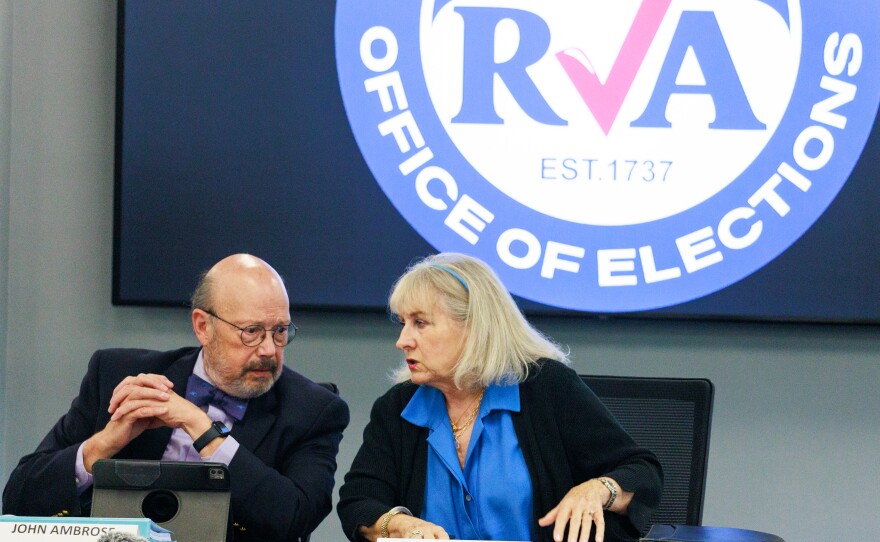After polls close Tuesday in Virginia, a month-or-longer process of vote counting, certification and risk-limiting audits begins.
Local and state elections officials will follow detailed steps laid out in state law and regulations to confirm beyond any doubt the race results that many news outlets — VPM News included — will unofficially call on election night. According to a recently published report by the nonprofit Informing Democracy, the commonwealth’s system is very secure.
“The good news about Virginia — unlike some states — Virginia's elections are largely well run by dedicated public servants,” said Jenna Lowenstein, executive director of Informing Democracy, a nonprofit that researches election processes and officials.
The report features a detailed timeline of events, plus extensive documentation describing each step of how vote counting works.
How the local process works
Counting officially begins on Election Day — but local registrars have been busy pre-processing absentee ballots since Halloween. That process ensures that voters have included all necessary information with their ballot — if anything is missing, the registrar’s office will reach out to the voter to get it fixed before vote counting wraps up.
Absentee ballots are sent to Central Absentee Precincts, where election officials officially record the votes on Election Day.
Early in-person votes are recorded by machine at the time of voting — the tallies of each machine are read out after polls close on Election Day. In-person voting on Nov. 7 follows the same process.
Counting can take some time. In 2020, a COVID-19 outbreak at the Richmond registrar’s office led to a delay in state certification of results. Newer processes, like absentee preprocessing, are intended to avoid delays like that.
Once all votes in a locality are counted, electoral boards will hold a canvass no later than 5 p.m. Nov. 14, when full results are compiled from early, mail-in and Election Day votes. Local officials are also responsible for reaching out to voters with incomplete ballots for an opportunity to “cure” and count the votes by that deadline.
How the state process works

Once local results are canvassed, the state still must certify results and tally up votes for races that have voters in multiple localities — lots of General Assembly races, especially in the Senate, fit that bill.
Once it has received all the local tallies, the Virginia Department of Elections will select races — including at least one General Assembly contest — for a risk-limiting audit. Localities can request that contested races with a margin greater than 1% be audited. In that process, trained local officials hold public meetings where they take a selection of ballots and compare them by hand to the recorded results. The process can take several days to complete.
The deadline to request recounts is 10 days after results are certified at the local level. State law says that a recount can only occur if the final margin is 1% or less than the total votes cast in the contest. That goes for both races with candidates — like all 140 General Assembly contests — and referendum votes, such as the casino question Richmond City voters will decide.
Finally, the state Board of Elections must certify all results by Dec 4.
Contesting elections
Candidates can contest their loss up to 30 days after Election Day or three days after a recount, whichever comes later. They must include grounds for the contest, which may include:
- objections to the winner’s eligibility
- objections to the conduct or results of the election, including specific allegations which, if true, would have a probable impact on the election
- or both of the above
For General Assembly races, all evidence for and against the contest must be filed with the clerk of the house in question, either the House of Delegates or the Senate. That body’s Committee of Privileges and Elections then investigates and presents its findings to the full body — which then votes to elect either the contestant or the original winner. It’s unclear if that vote would occur during the lame duck session or after the state’s new slate of representatives has been sworn in.
What if someone breaks the rules?
If it becomes clear that local officials have failed to follow laws or regulations, there are ways of dealing with potential misconduct.
“The state board has the power to remove local officials for any failure to discharge their duties responsibly,” Lowenstein of Informing Democracy said.
Despite lauding Virginia’s institutional security, the report does flag some local officials for contributing to “anti-democratic trends.”
Those include Clara Belle Wheeler, vice chair of the Albemarle County Electoral Board — who held a poll-watcher training at an event hosted by election deniers.
Other localities with officials flagged for anti-democratic actions include Brunswick, Campbell, Fairfax, Frederick and Loudoun counties, Hampton, Lynchburg, Newport News, Petersburg, Portsmouth and Roanoke.
Despite concerns with the actions and statements of some appointed public officials, Lowenstein remained positive about Tuesday’s election.
“We feel confident and want Virginia voters to feel the confidence that they can cast their ballots and that they'll be counted securely,” she said.



